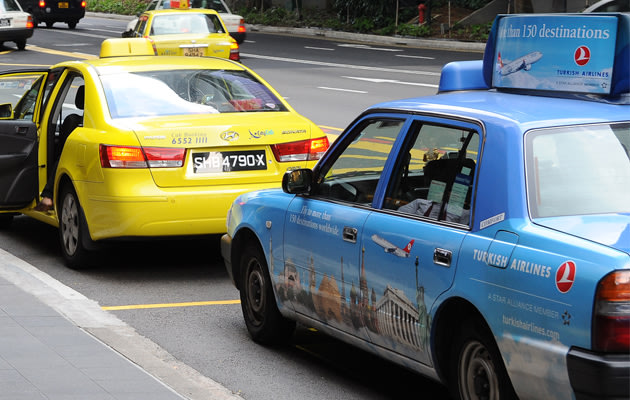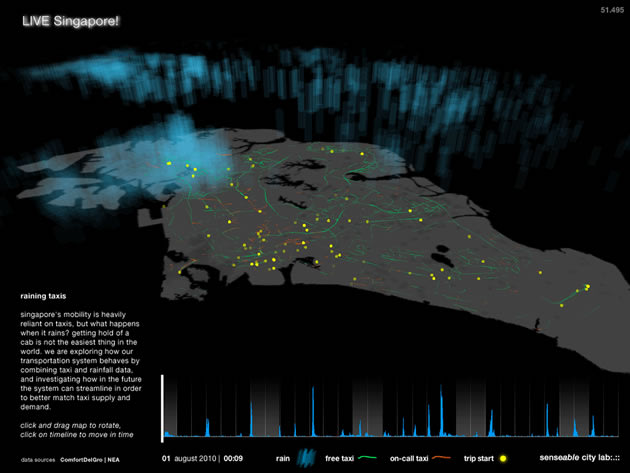- Joined
- Aug 29, 2008
- Messages
- 26,505
- Points
- 113
Why it's so hard to get a cab when it pours: study

<cite class="byline vcard" style="font-style: normal; color: rgb(125, 125, 125); font-size: 12.499999046325684px; display: inline-block !important; font-family: Georgia, Times, 'Times New Roman', serif; vertical-align: middle; line-height: 2.2em; ">

By Jeanette Tan | Yahoo! Newsroom – <abbr title="2012-10-04T17:38:10Z" style="border: 0px; ">15 hours ago</abbr></cite>

Why is it always more difficult to flag down taxis on rainy days? One study yields interesting findings. (Yahoo! file photo)
Ever wonder why cabs are like gold when it rains and you need one the most?
Well, a five-month study initiated by the the Singapore-MIT Alliance for Research and Technology (SMART) may have the answer.
According to the study that compared weather patterns and taxi movement in Singapore, taxi drivers (from ComfortDelgro) are wont to park by the side of the road and remain stationary when it's pouring instead of risking an accident on slippery roads.
That's because of a taxi company policy that requires up to S$1,000 of a taxi driver's salary to be withheld when an accident happens. Only when the cabbie is cleared of any wrongdoing or negligence will the sum be returned.
Researcher Oliver Senn, who is from SMART, analysed satellite data on weather conditions over a two-month period. He also obtained some 830 million global positioning satellite (GPS) records of a hefty 80 million taxi trips.
The data showed him it wasn’t the high demand for taxis that resulted in a seeming shortage on rainy days — instead, it appeared that many simply did not pick up passengers, fearing accidents on the road.

A five-month study revealed that cab drivers have the tendency to stop by the roadside when it rains. (Photo courtesy …
Senn observed that the GPS data tracking some 16,000 ComfortDelGro taxis (the rough size of its fleet) reflected that many of them were stationary during rainstorms, pulling over and not picking passengers up at all.
Upon cross-checking with drivers, the senior research engineer was told that drivers decided it was not worth the risk of having their money tied up for the extended period, and stopped their taxis to wait out downpours.
Several ComfortDelGro taxi drivers Yahoo! Singapore spoke to said they did not know of a salary system in place with the company, as they and those they knew rented their own taxis.
The general practice for most taxi drivers, however, is to earn their own income from the passengers they pick up, and they are regarded as self-employed, paying rental to the parent company from which they obtain their taxis.
One driver in particular, who wished to remain unnamed, related a similar experience with the previous taxi company he drove for — except what they set aside was a sum of money from the deposit he initially placed with them, and he was expected to top it up to the original amount while waiting for the outcome of the accident investigation.
When asked about stopping their vehicles or not picking up passengers in the event of heavy rain, the drivers cited reasons of limited visibility and slippery roads as greater reasons for stopping than the apparent policy in place.
Spokespersons for ComfortDelGro have yet to respond to queries about their existing policy pertaining to taxi accidents.
The study Senn conducted is one of a series of case studies done across the region, as part of a project known as “The Human Face of Big Data”, sponsored by EMC.
The project, launched in Singapore earlier this week, aims to crowdsource large amounts of data from citizens across the world to crunch and create findings on pertinent issues in real-time.

<cite class="byline vcard" style="font-style: normal; color: rgb(125, 125, 125); font-size: 12.499999046325684px; display: inline-block !important; font-family: Georgia, Times, 'Times New Roman', serif; vertical-align: middle; line-height: 2.2em; ">

By Jeanette Tan | Yahoo! Newsroom – <abbr title="2012-10-04T17:38:10Z" style="border: 0px; ">15 hours ago</abbr></cite>

Why is it always more difficult to flag down taxis on rainy days? One study yields interesting findings. (Yahoo! file photo)
Ever wonder why cabs are like gold when it rains and you need one the most?
Well, a five-month study initiated by the the Singapore-MIT Alliance for Research and Technology (SMART) may have the answer.
According to the study that compared weather patterns and taxi movement in Singapore, taxi drivers (from ComfortDelgro) are wont to park by the side of the road and remain stationary when it's pouring instead of risking an accident on slippery roads.
That's because of a taxi company policy that requires up to S$1,000 of a taxi driver's salary to be withheld when an accident happens. Only when the cabbie is cleared of any wrongdoing or negligence will the sum be returned.
Researcher Oliver Senn, who is from SMART, analysed satellite data on weather conditions over a two-month period. He also obtained some 830 million global positioning satellite (GPS) records of a hefty 80 million taxi trips.
The data showed him it wasn’t the high demand for taxis that resulted in a seeming shortage on rainy days — instead, it appeared that many simply did not pick up passengers, fearing accidents on the road.

A five-month study revealed that cab drivers have the tendency to stop by the roadside when it rains. (Photo courtesy …
Senn observed that the GPS data tracking some 16,000 ComfortDelGro taxis (the rough size of its fleet) reflected that many of them were stationary during rainstorms, pulling over and not picking passengers up at all.
Upon cross-checking with drivers, the senior research engineer was told that drivers decided it was not worth the risk of having their money tied up for the extended period, and stopped their taxis to wait out downpours.
Several ComfortDelGro taxi drivers Yahoo! Singapore spoke to said they did not know of a salary system in place with the company, as they and those they knew rented their own taxis.
The general practice for most taxi drivers, however, is to earn their own income from the passengers they pick up, and they are regarded as self-employed, paying rental to the parent company from which they obtain their taxis.
One driver in particular, who wished to remain unnamed, related a similar experience with the previous taxi company he drove for — except what they set aside was a sum of money from the deposit he initially placed with them, and he was expected to top it up to the original amount while waiting for the outcome of the accident investigation.
When asked about stopping their vehicles or not picking up passengers in the event of heavy rain, the drivers cited reasons of limited visibility and slippery roads as greater reasons for stopping than the apparent policy in place.
Spokespersons for ComfortDelGro have yet to respond to queries about their existing policy pertaining to taxi accidents.
The study Senn conducted is one of a series of case studies done across the region, as part of a project known as “The Human Face of Big Data”, sponsored by EMC.
The project, launched in Singapore earlier this week, aims to crowdsource large amounts of data from citizens across the world to crunch and create findings on pertinent issues in real-time.
Last edited:
